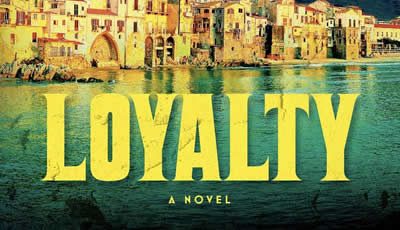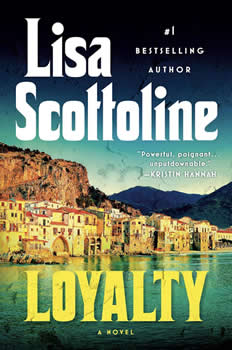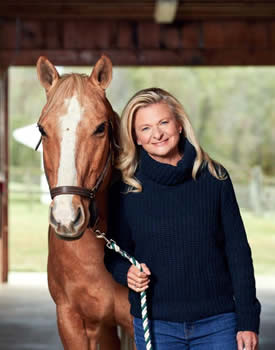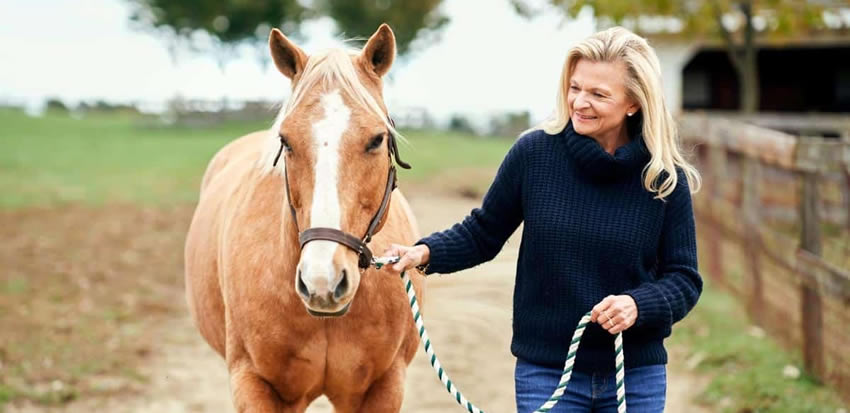

Features Up Close: Lisa Scottoline
Loyalty Can Save a Soul—or Destroy One
In 19th century Sicily, family is everything.
This sentiment is embodied in Lisa Scottoline’s riveting new release, LOYALTY. In it, Franco Fiorvanti works in the lemon groves of Baron Zito and dreams of marrying his true love, but the island’s rigid class system holds him back. He believes he can cross class lines by ingratiating himself to the baron, who has him arrange the kidnapping of a little boy. At the same time, Franco organizes a vigilante group to protect the caravans transporting the lemons from the groves to the port of Palermo from bandits. The vigilante group grows to control the entire area and becomes the area’s first Mafia family.
Gaetano Catalano, an idealistic young Palermo lawyer devoted to justice, is a member of a secret society of aristocrats who investigate crime on the corruption-riddled island. When Gaetano sets out to find the boy and bring him home, his mission becomes an obsession.
Dante, the kidnapped boy, grows up in a madhouse. He believes he is insane, until he meets Lucia, a girl with her own tragic past. They fall in love and set out to find Dante’s kidnapper and learn his true identity.
As secrets are uncovered, the lives of these characters collide in a monumental showdown that tests their courage, their concepts of justice versus law, and their devotion to loyalty.
LOYALTY, which was published on March 28, follows Eternal, Scottoline’s masterpiece set in Rome during WWII. These two epic historical novels represent a departure from her series and other standalones.
Scottoline graciously took time from her busy schedule to tell us more.
The historical information you include in LOYALTY is fascinating. What inspired you to write about the origin of the Mafia?
I hadn’t intended to write about the beginning of the Mafia when I started this novel. I was thinking more in terms of the crime of kidnapping, so prevalent in the 1800s and the general lack of the rule of law and justice, which are themes that have always interested me and unfortunately are still resonant even today. But on a research trip to Sicily, which was awesome and carbohydrate filled, I realized that you couldn’t examine crime in that time period without reference to the Mafia. I did the research on site and later at home, learning about the legal, social, political, and economic conditions that gave rise to the Mafia that had never been examined before in popular fiction, despite the fact that there are so many mafia movies and I love every single one of them. So I got busy.
Sicily is very much a character in your story, and the depth and breadth of your research is impressive, including the excellent series of videos you made to document your visits there. In a way, LOYALTY is a love letter to Sicily. What attracted you to the island—its cities, villages and farms, its people, food, and culture?
Thank you so much! I’m Italian American, and my mother’s family is from southern Italy, which is very much historically simpatico with Sicily. The more I read about Sicily’s history, I realized that it was unique, not really Italian but Sicilian, and that because it was an island in the middle of the Mediterranean, it was a special place. For example, not only did the Mafia arise there, but also in the 1400s, Sicilian Jews were actually exiled from the island. Even today, there are still very few Jews in all of Sicily. That fact presents a true collision between law and justice, since Jews were exiled legally but hardly justly, under the Spanish Inquisition. So that’s a tailor-made topic for me.
Tell us about your choices for the main characters: Franco, Gaetano, Dante, and Lucia. How did you select them, and how did you bring their various points of view to life? Was it typical of the period for some people, like Mafalda, Lucia, and Antonio, to live apart from the rest of society?
I write without an outline, so this very thoughtful question is going to get a disappointing answer. Honestly, I just went with my heart and mind. My process is to jump right in and see how it goes and what characters actually introduce themselves. I know that sounds metaphysical, but it’s really a product of impatience, and I couldn’t imagine writing a big long outline and then filling in the blanks, like literary mad libs. The only character I knew was Franco, but then I thought about Gaetano, since he’s basically such a good man, though flawed, and I realized that I wanted to tell the story of the Jews of Sicily, and I also wanted to talk about women and about the folkloric and superstitious aspect of Sicilians, because I was raised by a mother who believed in the evil eye. That never leaves your system, which is both good and bad news.
LOYALTY has a really intricate plot. I’ve read you don’t plot in advance, but let your stories unfold on the page. How do you weave in all the complexities and plot twists while you’re winging it?
Thank you so much for saying so about the plot, and I honestly think it’s proof of a deity, whatever you want to call him or her. I swear to God, I just start and every day think about what would happen next. I am a living example of a quote by E.L. Doctorow that my daughter found, “Writing is like driving at night in the fog. You can only see as far as your headlights, but you can make the whole trip that way.” I’ve proven that to myself over 35 years and about 35 novels. It’s a scary way to write, but it’s inspiring because there are no prerequisites. I would really encourage anybody who wants to write that they should feel completely free to follow that dictum. It’s good news for impatient people.
What was your biggest challenge in writing LOYALTY? How was it rewarding for you?
Wow these are excellent questions. The biggest challenge in writing the novel is exactly what I’m saying above; in other words, if you choose to write without an outline, you’ll be anxious a lot of the time. You won’t know where this story is going, and you won’t know how it ends. You can’t help it, that’s the method, but you have to recognize that it produces an enormous amount of anxiety. You have to learn to live with that. You have to have faith in yourself and in your story. You have to sit down every day, even for 20 minutes, and try to get your words out of your body and onto the page. Sometimes I say to myself, “Write a bad chapter, right now.” Anybody can write a bad chapter. It’s all about your confidence level, and even for someone who’s been in this business a long time like me, my confidence goes up and down. You just have to power through. Like Churchill says, “When you’re going through hell, keep going.” And the reward is fantastic when you do it that way, because there’s this huge release when you realize you have a story, and it ends great, and it’s all organic, and you never have to go back and change anything, because it was built from the ground up and has a solidity and integrity that you can be really proud of.
You’ve written such a wide variety of stories over the course of your career, from your Rosato series, to standalones, to humor, yet LOYALTY is a story of epic proportions. What led you in this direction?
How kind of you to say so. Honestly I’m very proud of my body of work, and as an English major, sometimes I look back and analyze my own novels and growth in scope, too. I know that sounds braggy, but I’m really trying to open up the scope of my novels and get really epic. I think my novels have always dealt with themes of family, love, and justice, and the domestic standalones and Rosato tell those stories on a very relatable level, but I wanted to tell them on a bigger canvas, historically and epically. What’s interesting is that you realize that the same principle applies, whether the story has a narrow scope or a wider one, and that’s the coolest thing about the arts. You have to begin with some authentic story and resonant theme, and then you can just open your arms up and let it fly.
You are unsparing in the depiction of the violence that pervades the culture of this period in Sicily’s history. How does it contribute to the story?
I think you have to look violence in the eye when it happens, and you cannot sanitize it. That’s true in history, and even in our own era, when we see so much more violence, not only at street level, but writ large. Violence is the result of anti-law, in other words, when you lack the rule of law, you have violence, and the very purpose of law is to resolve disputes without violence. Peace is justice, and justice is peace—to borrow a construction. It’s true throughout history, and it’s true even today. Fear of violence suppresses truth and all the freedoms that we as Americans hold dear, and those freedoms that are held dear around the globe. So you mustn’t ever look away from violence, but try to understand why it matters.
I’ve read you began writing fiction after the birth of your daughter. What caused you to leave your law career and attracted you to fiction?
Honestly, it was the birth of my daughter, coming unfortunately at about the same time as my first divorce, and the growing realization that I wanted to stay home and raise her as a full-time mother. It was a very personal decision, and one made completely out of love. I went totally broke for a long time, and she and I both struggled, but it has such an amazingly happy ending, and the most important part of it is not my career, but the fact that I have such a wonderful relationship to my incredible daughter, Francesca Serritella, now a novelist in her own right.
You are a #1 bestselling author of 35 novels, with 30 million books in print. When you first started writing fiction, did you ever imagine this level of success? How do you deal with it?
How kind of you to say, but I honestly don’t feel that successful, and I think every writer, beginning or bestselling, will recognize this truth. We all sit down before a blank page. That is the most humbling act ever. It doesn’t matter if you’ve written before or have never pecked out a single word. We all face the same blank page, and I hope that gives heart to those who want to get their books written and eventually into print. I hope they do it and I hope they stay with it. I swear to God, that’s all it takes. Just keep going until they publish you. Be undeniable.
What advice do you have for aspiring authors?
What I said above. I love giving advice. I want to help new writers. I’m full of advice. Someone the other day during an interview asked me if I had any questions, and I said, No, I have answers. This is what happens when you get older.
What’s next for you?
I’m working on a domestic thriller and pounding it out as we speak.
- The Big Thrill Recommends: SERVED COLD by James L’Etoile - July 26, 2024
- The Big Thrill Recommends: THE PARIS VENDETTA by Shan Serafin - June 27, 2024
- The Big Thrill Recommends: THE GENERAL’S GOLD by LynDee Walker and Bruce Robert Coffin - April 25, 2024






